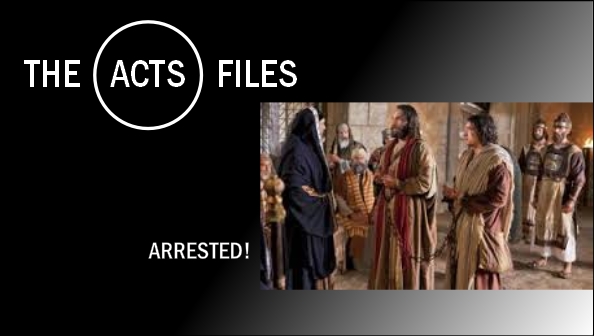By Tyson Thorne

In Acts chapter 3 Peter and John were having an amazing day. They had been to prayer twice already, at nine and noon, and now at three in the afternoon they were able to heal a lame man and tell all who were there about Jesus, the Messiah. What was the net effect? 5,000 came to trust in Jesus as the savior and the two apostles were arrested (at the beginning of chapter 4).
According to author Ravi Zacharias in his book The Scandalous Jesus, according to Roman tradition no one was to speak the name of a crucified criminal. It was as if their very existence were to blotted out of history. It was a most despicable violation of cultural morals to remember and speak of those Rome deemed worthy of their most painful death. When the religious rulers of Jerusalem asked Rome to crucify Jesus, it wasn’t solely because they did not have the authority of execution. They wanted Jesus crucified so that his life would never be spoken of. And now, only a month or two after Jesus’ execution, these two men dared to speak the name of Jesus.
Adding insult to injury the Sanhedrin, who ruled the political affairs of the temple, did not believe in resurrection of any kind. So the apostles were teaching in the name of a crucified man about a theology the temple priests flatly denied, and in doing so accused the high priest himself of treachery and making all of Israel guilty of murder. Is it any wonder they chose to arrest Peter and John?
It being too late in the day to arraign them, the authorities imprisoned the two apostles overnight to face charges the following morning. When morning came the authorities along with legal experts met with Peter and John and asked how they healed the lame man. Peter, ever willing to speak his mind, told them outright that the healing took place in the name of Jesus and, for good measure added, “whom you crucified.”
Angered, the rulers found themselves in a political debacle. They would like nothing more than to lock the two apostles up in the deepest, darkest place they could find, but there was no denying the miracle that occurred. If only the miracle hadn’t been so public, but thousands were witnesses. Peter and John could not be “disappeared” do easily. If they couldn’t get rid of them, then perhaps they could at the very least silence them. After their conference they returned to the court room and told the disciples in no uncertain terms they were not to speak of Jesus any longer. But the threats rang hollow, and Peter and John knew it.
In a dramatic and bold response Peter told the religious leaders, “Whether it is right before God to obey you rather than God, you decide, for it is impossible for us not to speak about what we have seen and heard.” In other words, “Whatever. Can we go now?”
Jesus had his run-ins with the law, and now his disciples were too. It is not unusual for practicing Christians to have to defend themselves from the authorities. In fact, it is best to expect and be prepared to do so. In my own life I was sent to the Principal’s office in high school several times for bringing a Bible to class and sharing Christian literature with other students on campus. I’ve had the police brought in by museum and zoo employees when teaching Biblical truths on their campuses. I’ve had to deal with police officers when talking about Jesus in public places. In every instance, thanks to America’s constitution, I’ve prevailed. Such experiences come to all who live their faith openly.
|
|
|